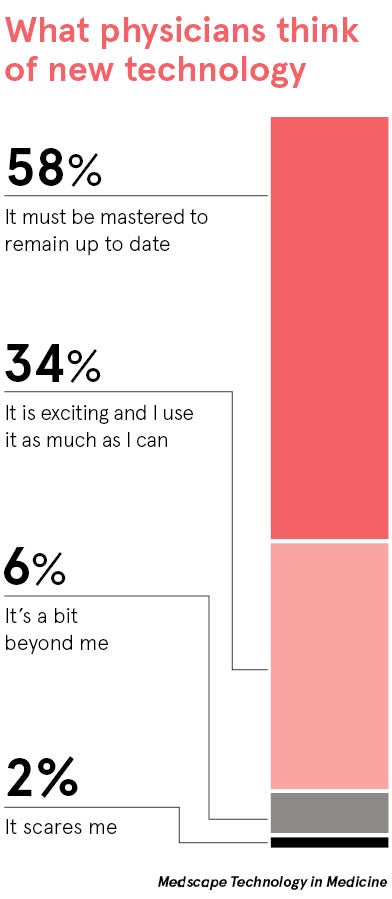Most physicians, who tend to be cautious by nature, are sceptical about the relevance of many technology innovations in their day-to-day practice, and with good reason.
 The rate of innovation, from digital health wearables to artificial intelligence (AI), has been explosive, but for the vast majority of physicians this rapid-fire pace has not been met with a significant level of practical, sustainable applications.
The rate of innovation, from digital health wearables to artificial intelligence (AI), has been explosive, but for the vast majority of physicians this rapid-fire pace has not been met with a significant level of practical, sustainable applications.
It may be “buzz-worthy”, but if the new product or platform doesn’t deliver as promised, or isn’t relevant to the physician’s work, then chances are it hasn’t addressed a simple question: does the technology support physicians in delivering care to patients?
It is in this space where Medscape puts its focus. With more than two million active users globally, Medscape is among the largest platforms for news, clinical information and education for physicians, providing updates on leading-edge medical and technological advancements, innovative immersive physician learning solutions, and digital tools to enhance the point-of-care experience.
Separating “fluff” from meaning
The impact of technology in medicine is clearly being recognised in clinical care. The US Food and Drug Administration (FDA) recently approved an AI algorithm that helps patients get data from their smartwatch to support an accurate diagnosis for atrial fibrillation, and there are new digital technologies to support the treatment of eye diseases and managing blood pressure and diabetes.
Physician crowdsourcing is becoming an essential resource for physicians looking for advice and insights from colleagues around the world. And virtual reality (VR) and AI have the power to enhance a physician’s learning experience, thus boosting the potential to apply leading-edge clinical information to improve patient outcomes.
Medscape’s insight-led innovation
With meaning, value and relevance driving the development process, Medscape sees technology from the users’ and learners’ perspectives, focusing on the product impact and leveraging those insights to help determine the tools that it creates. Medscape’s most recent innovations support physicians in making accurate diagnoses and treatment decisions, with the potential to reduce unnecessary testing and improve care.
With meaning, value and relevance driving the development process, Medscape sees technology from the users’ and learners’ perspectives
Medscape Consult™ is a powerful solution that allows physicians to ask and answer clinical questions, and share and discuss clinical challenges from colleagues around the world at the point of care. It wasn’t enough to give doctors another social media community; instead Medscape provides a moderated environment with editorial oversight, expert authors and reviewers for selected content, and partnerships with leading physicians’ professional organisations.
Physicians told Medscape that the value of the platform would lie in its clinical utility, its practicality, simplicity and rigour as well as community, and it has delivered often ahead of medical news headlines.
A case in point concerned the outbreak of the Zika virus, which sparked intense discussion on the Medscape Consult platform after a Brazilian paediatrician posted a question regarding an unusual spike in cases at his clinic of microcephaly, a birth defect in infants exposed to the virus in utero. With insights from physicians on the platform, the physician confirmed that the cases were likely to be linked to Zika, more than a week before reports from international health agencies.
Medscape Education, meanwhile, is constantly developing innovative approaches to improve the physician learning experience, with immersive solutions that engage and challenge physicians, while driving increased retention and improvements in recognising and optimally treating disease.
Offering alternatives to darkened lecture halls and traditional conference presentations, a new suite of learning technologies and tools leverage the impact of virtual patient simulation. With VR and AI technologies, this replicates the realism and unpredictability of actual practice through case-based scenarios, with data showing that Medscape’s platforms have the potential to improve physician diagnosis and treatment for a range of conditions, including diabetes and HIV.
Additionally, other Medscape Education applications include Learning Labs, which are small group “mixed reality” or VR experiences; Virtual Clinical Practice, which simulates real-world skills training, and online platforms that enable clinicians to access immersive content anywhere using a variety of personal VR headsets.
Technology may be driving significant changes in society and the potential to improve medical outcomes is unquestionably great, but its greatest potential may lie in bolstering clinical care knowledge and insights, while strengthening the real-life human bonds between physician and patient.
For more information please visit medscape.com

